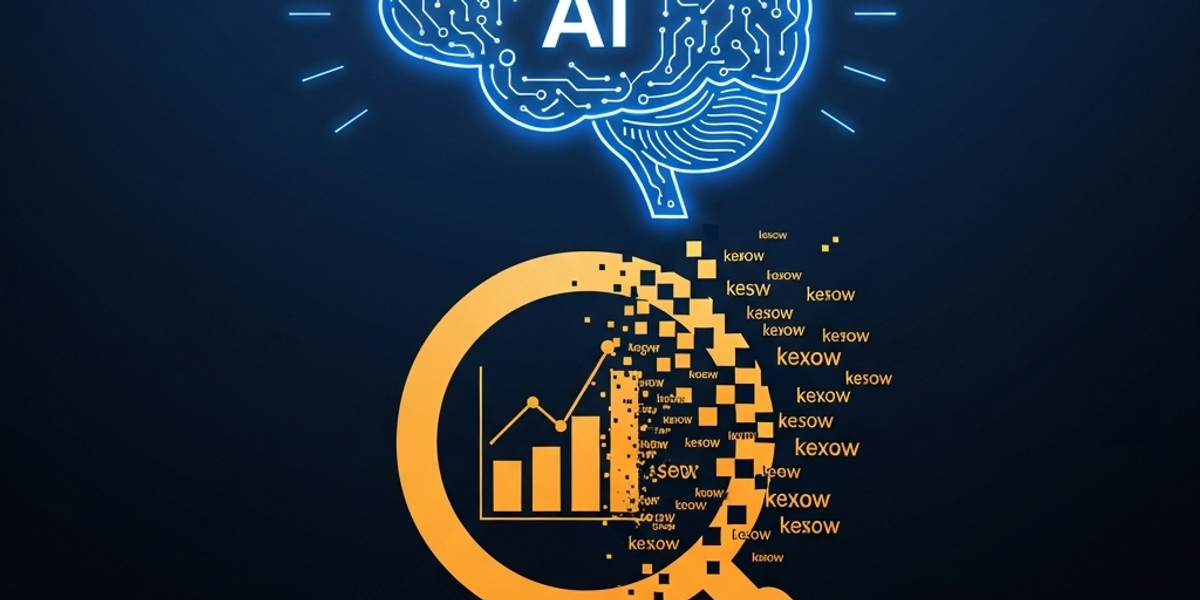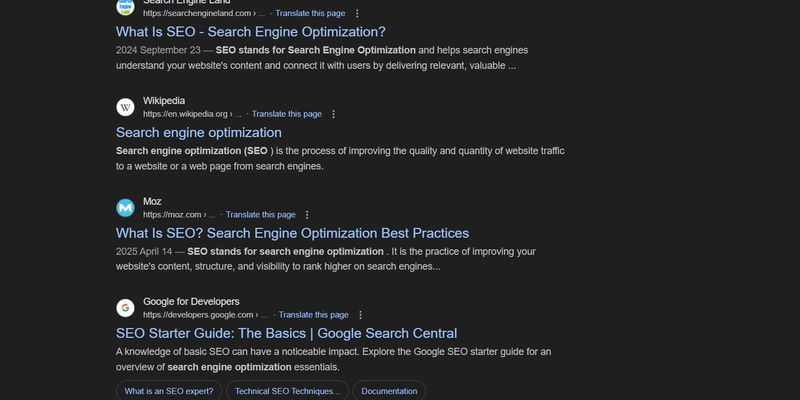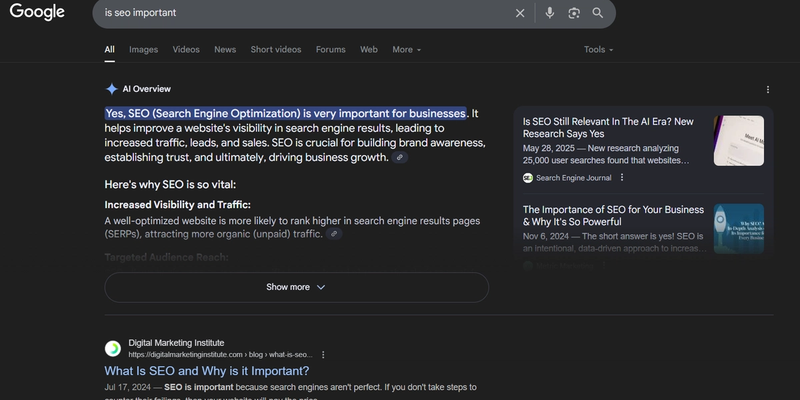
Will AI Kill SEO? The Ultimate Guide to the Future of Search (2025 Update)
Let's cut right to the chase. The question on every digital marketer's, business owner's, and content creator's mind is a big one: Will AI kill SEO?
The short answer is a definitive no.
But that "no" comes with a giant asterisk. AI isn't the asteroid coming to wipe out the world of Search Engine Optimization. Instead, think of it as a massive climate change event. The environment is shifting dramatically, and only those who adapt will survive and thrive. SEO isn't dead, but SEO as we knew it is over.
The fear is real and understandable. When you see Google's new Search Generative Experience (SGE) providing a complete, AI-written answer at the very top of the page, it's natural to wonder, "Why would anyone click on my website anymore?"
This guide will break down exactly what's happening, why you shouldn't panic, and most importantly, how to adjust your strategy to win in this new AI-powered era of search.
What is AI in Search, Anyway? (A Simple Explanation) 🤖
Before we talk about the future, let's quickly understand the present. AI has been a part of Google for years. You've already been interacting with it!
- RankBrain: This was one of Google's first AI systems, launched back in 2015. Its main job is to understand new or confusing search queries it has never seen before and match them to the best possible results.
- BERT & MUM: Think of these as huge upgrades to Google's brain. BERT (2019) helped Google understand the context and nuances of your search queries—the relationship between words. MUM (2021) is even more powerful, able to understand information across different languages and formats (like text and images) to answer complex questions.
- The Big One: SGE (Search Generative Experience): This is the game-changer you're seeing now. Instead of just giving you a list of blue links, SGE uses generative AI (like the technology behind ChatGPT) to read and synthesize information from multiple top-ranking websites. It then creates a brand-new, conversational "AI Snapshot" to directly answer your question right on the results page.
Before:

After:

This evolution shows a clear pattern: Google wants to be an answer engine, not just a search engine. It wants to give you information directly, not just point you to where you can find it.
Why People Fear AI Will Kill SEO: The Rise of "Zero-Click" Searches
The core fear comes down to one thing: traffic loss. The logic is simple:
A user searches for something (e.g., "how to bake sourdough bread").
SGE provides a beautiful, step-by-step guide directly in the search results, complete with images and tips, all synthesized from the best websites.
The user gets their answer without ever needing to click on a single website. This is called a "zero-click search."
For a business that relies on website traffic to generate leads, sell products, or earn ad revenue, this scenario is terrifying. If clicks disappear, so does the business model. This is the central argument for the "AI will kill SEO" camp. They believe that by answering queries directly, Google is effectively taking the traffic for itself, making the websites it learned from obsolete.
And to be fair, for some types of queries, traffic will undoubtedly decrease. Simple, factual questions like "How tall is Mount Everest?" or "What is the capital of Nepal?" will likely be fully answered by AI. But this is only a small part of a much bigger picture.
The Real Answer: AI is Evolving SEO, Not Destroying It 🌱
Here’s the reality: SEO isn't about clicks. It never was. SEO is about being the most relevant and authoritative answer for a target audience. Clicks are just one metric we use to measure that.
AI doesn't change the goal; it changes the methods we use to achieve it. Here’s how the focus is shifting.
1. The New Goal: Become a Trusted Source for the AI
Where does Google's SGE get its information? It doesn't just invent it. It actively crawls, reads, and synthesizes information from existing web pages that it deems to be credible, authoritative, and trustworthy.
Your new primary goal in SEO is to have content so good that Google's AI chooses to cite you.
Being featured in an AI Snapshot is the new "position zero." While it might not always result in a direct click, it builds immense brand awareness and establishes your website as an authority in your niche. The links to the source websites are still there, right next to the generated answer, and users seeking more depth will click them.
2. E-E-A-T is No Longer a Suggestion—It's a Commandment
To become a trusted source for AI, you must master Google's E-E-A-T guidelines:
- Experience: Do you have real, first-hand experience with the topic? A review of a hiking trail in Kathmandu written by someone who has actually hiked it will be valued more than one written from a desk.
- Expertise: Are you a recognized expert? Show off your credentials, qualifications, and knowledge.
- Authoritativeness: Is your website a known authority in your industry? This is built over time with high-quality content and backlinks from other respected sites.
- Trustworthiness: Is your site secure (HTTPS)? Is your contact information clear? Are your sources cited? Can users trust you with their information and their time?
Content that is generic, superficial, or written by an anonymous author will be ignored by AI. Content that demonstrates deep E-E-A-T will be rewarded.
3. From Keywords to Concepts: The Rise of Topical Authority
Old SEO focused on ranking for individual keywords. New SEO focuses on owning entire topics.
Instead of just writing one blog post about "best running shoes," a modern SEO strategy involves creating a comprehensive "content cluster." This could include:
- A main pillar page: "The Ultimate Guide to Choosing Running Shoes"
- Supporting articles: "Best Running Shoes for Flat Feet," "How to Clean Your Running Shoes," "Nike vs. Adidas: Which is Better for Runners?," "Understanding Pronation in Runners."
By creating a web of interconnected, in-depth articles, you signal to Google's AI that you are not just a source for a single keyword, but a deep authority on the entire topic of running shoes. This makes it far more likely that the AI will use your content cluster as a primary source for a wide range of related queries.
How to Win at SEO in the Age of AI: Your Action Plan 🏆
Feeling overwhelmed? Don't be. Here is a practical, step-by-step plan to adapt your SEO strategy for the AI era.
Step 1: Double Down on High-Quality, People-First Content
This is non-negotiable. Your content must be better than ever.
- Go deep: Write the most comprehensive, helpful, and detailed articles on a topic. Think 2,000+ words, not 500.
- Add unique value: Include original research, data, case studies, personal experiences, expert quotes, and custom images or videos. Give the reader (and the AI) something they can't get anywhere else.
- Prove your E-E-A-T: Create detailed author bios. Showcase your credentials. Link to your sources. Be transparent and build trust.
Step 2: Embrace AI as Your Co-Pilot, Not Your Replacement
AI tools can supercharge your SEO efforts. Don't let them write your content from scratch, but use them to:
- Brainstorm ideas: Ask AI for content ideas, angles, and outlines.
- Optimize your writing: Use tools like SurferSEO or MarketMuse to analyze your content against top competitors and find semantic gaps.
- Automate technical tasks: Use AI to help you generate Schema markup, write meta descriptions, or analyze log files.
- Conduct research: Use AI to quickly summarize research papers or competitor articles to speed up your workflow.
AI handles the repetitive tasks, freeing you up to focus on strategy, creativity, and unique human insights.
Step 3: Master Technical and Semantic SEO
Your amazing content is useless if Google's AI can't find and understand it.
- Flawless Technical SEO: Your site must be fast, mobile-friendly, and easy for Google to crawl. A strong technical foundation is the price of entry.
- Implement Schema Markup: Schema is code that explicitly tells search engines what your content is about. Use it for FAQs, how-to guides, articles, and products to give AI clear context.
- Focus on Intent: Structure your content with clear H2 and H3 headings that directly answer questions. Use natural, conversational language. Think about what the user really wants when they search for something and provide the complete answer.
Step 4: Build Your Brand and Topical Authority
Ranking is no longer just about your website; it's about your brand's overall authority.
- Build real backlinks: Focus on earning links from reputable, relevant websites in your industry. Guest posting and digital PR are more important than ever.
- Promote your content everywhere: Share your expertise on social media, in forums like Reddit or Quora, and on podcasts. Build a brand presence beyond just Google search.
- Think in topics, not keywords: Plan your content strategy around core topics and build out comprehensive clusters of content.
The Human Touch: Why SEO Experts Are More Important Than Ever 🧑💻
Can AI write an article? Yes. Can it build a comprehensive, multi-channel marketing strategy rooted in a deep understanding of a business's unique goals and its customers' psychological triggers? Absolutely not.
AI is a tool. It's an incredibly powerful one, but it lacks the critical thinking, creativity, ethical judgment, and strategic oversight that a human expert provides.
The future of SEO belongs to the strategists. It belongs to the people who can:
- Understand a business's core objectives.
- Conduct deep audience research to uncover true intent.
- Build a holistic content and brand strategy.
- Use AI tools to execute that strategy efficiently.
- Analyze complex data and pivot when necessary.
- Infuse content with genuine human experience and storytelling.
So, will AI kill SEO? No. It will kill lazy SEO. It will kill low-effort content, keyword-stuffing, and cheap tricks. But for those willing to adapt, AI is the most powerful tool we've ever been given. It's forcing us all to be better marketers, create more valuable content, and build stronger brands.
The future of search isn't about man versus machine. It's about man with machine. And for those who embrace that partnership, the future is incredibly bright.
🚀 Ready to Level Up Your SEO Content?
Join the waitlist to access our upcoming SEO AI Agent platform—designed to automate SEO optimization for busy founders.